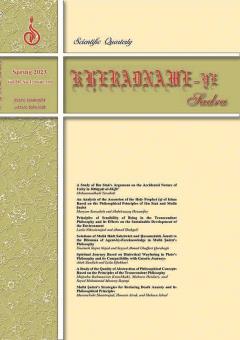Spiritual Journey Based on Dialectical Wayfaring in Plato’s Philosophy and its Compatibility with Gnostic Journeys
Subject Areas : مطالعات تطبیقی فلسفههای اشراقی/ مشرقی
Atiye Zandieh
1
*
,
Leila Eftekhari
2
![]()
1 - Assistant Professor, Philosophy and Wisdom, Shahid Motahari University, Tehran, Iran
2 - MA Student of Philosophy and Wisdom, Shahid Motahari University, Tehran, Iran
Keywords: Dialectic, Islamic gnosis, Plato’s philosophy, allegory of the cave, four-fold, mystic journey, analogy of the divided line,
Abstract :
In Plato’s philosophy and Islamic gnostic tradition, the world and Man enjoy two corporeal and spiritual dimensions. Man’s spiritual dimension can have ascending and descending journeys in the worlds of being. In Islamic gnosis, going through the levels of being – the five divine presences – has been explained by resorting to the four-fold journeys, which include moving from the creature to the truth, traversing the truth, moving from the truth to the creature and, finally, travelling with the truth in the creature. The spiritual journey in Plato’s philosophy can be explained by using the dialectical wayfaring, analogy of the divided line, and the allegory of the cave. Plato generally dealt with this spiritual journey and did not intend to classify its levels. However, his views can be formulated in a way to conform to these four journeys. In this way, spiritual journey in Plato’s philosophy will include the following four stages: moving from shadows to the world of Ideas, traveling through the Ideas, moving from the world of Ideas to the world of sensibles and, finally, traveling with the Ideas in shadows. Therefore, given the differences between these two schools of thought regarding their views of the highest levels of being and the perfect Man, the first, second, and fourth journeys can be more clearly matched with each other. The third journey can also be matched with one of them but not as clearly as the other three. Gnostics’ religious views, their emphasis on ascetic practice and purification of the soul, and the long time interval between these two systems of thought have resulted in a number of great differences between them.
آشتیانی، سیدجلالالدین (1370) شرح مقدمه قیصری بر فصوصالحکم، تهران: امیرکبیر.
ابنترکهاصفهانی، صائنالدين (1360) التمهید قواعد التوحید، تهران: انجمن حکمت و فلسفه ایران.
افلاطون (1366) دوره کامل آثار افلاطون، ترجمة محمدحسن لطفی و رضا کاویانی، تهران: خوارزمی.
برن، ژان (1363) افلاطون، ترجمة ابوالقاسم پورحسینی، تبریز: هماذر.
تلمسانی، عفیفالدینسلیمان (1392) شرح فصوص الحکم، تصحیح اکبر راشدینیا، تهران: سخن.
جامی، عبدالرحمنبناحمد (1393) نقد النصوص فی شرح نقش الفصوص، تحقیق سیدجلالالدین آشتیانی، تهران: مؤسسه پژوهشی حکمت و فلسفه ایران.
جوادیآملی، عبدالله (1383) رحیق مختوم، ج1، قم: اسراء.
جوادیآملی، عبدالله (1386) سرچشمۀ اندیشه، ج3، قم: اسراء.
جوادیآملی، عبدالله (1389) مراحل اخلاق در قرآن، قم: اسراء.
جوادیآملی، عبدالله (1390) تفسیر موضوعی قرآن کریم (صورت و سیرت انسان در قرآن)، ج4، قم: اسراء.
جوادیآملی، عبدالله (1395) تسنیم؛ تفسیر قرآن کریم، ج3، قم: اسراء.
حسنزاده کریمآبادی، داود (1390) «اسفار اربعه در عرفان اسلامی»، انوار معرفت، شمارة 2، ص40ـ9.
حیدری اردلان، سمیه (1389) تبیین تفسیر عرفانی نماز مطابق با اسفار اربعه از دیدگاه امام خمینی، پایاننامه کارشناسی ارشد، پژوهشکده امام خمینی و انقلاب اسلامی.
خمینی، روحالله (1372) مصباح الهدایة الی الخلافة و الولایة، مقدمه سيدجلالالدین آشتیانی، تهران: مؤسسه تنظیم و نشر آثار امام خمینی.
رستگار، حمیدرضا (1397) سلوک عرفانی و غایت آن از دیدگاه علامه طباطبایی، پایاننامه کارشناسی ارشد، دانشگاه ادیان و مذاهب.
رفیعی قزوینی، سیدابوالحسن (1367) مجموعه رسائل و مقامات فلسفی، تصحیح غلامحسین رضانژاد، تهران: الزهرا.
طوسی، نصیرالدین محمدبنمحمد (1403ق) شرح الإشارات و التنبیهات، قم: دفتر نشر کتاب.
عبوديت، عبدالرسول (1387) درآمدى به نظام حكمت صدرايى، ج2، تهران: سمت.
فرغانی، سعیدبنمحمد (1379) مشارق الدراری، شرح تائیه ابنفارض، تعلیق سیدجلالالدین آشتیانی، قم: دفتر تبلیغات اسلامی.
قمشهای، محمدرضا (1394) مجموعه آثار حکیم صهبا، عارف الهی آقامحمدرضا قمشهای، تصحیح حامد ناجیاصفهانی. تهران: آیت اشراق.
قیصری، شرفالدین داود بنمحمود (1376) شرح بر تائیه ابن فارض، تهران: میراث مکتوب.
قیصری، شرفالدین داود بنمحمود (1381) رسائل قیصری، تهران: مؤسسه پژوهشی حکمت و فلسفه ایران.
قیصری، شرفالدین داود بنمحمود (1386) شرح فصوص الحکم، بکوشش سيدجلالالدین آشتیانی، تهران: علمی و فرهنگی.
قیصری، شرفالدین داود بنمحمود (1394) شرح فصوص الحکم ابنعربی، تهران: مولی.
غفاری، ابوالحسن (1396) «بررسی و تحلیل نتایج اخلاقی تمثیل غار در اندیشه افلاطون»، انسانپژوهی دینی، شمارۀ 38، ص142ـ127.
کاپلستون، فردریک (1368) تاریخ فلسفه، ج1: یونان و روم، ترجمۀ سیدجلالالدین مجتبوی، تهران: علمی و فرهنگی.
کاشی، عبدالرزاق بنجلالالدین (1370) شرح فصوص الحکم، قم: بیدار.
کاشی، عبدالرزاق بنجلالالدین (1380) لطائف الاعلام فی اشارات اهل الالهام، تهران: میراث مکتوب.

